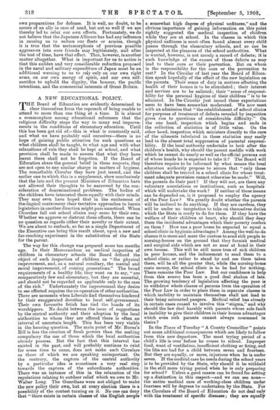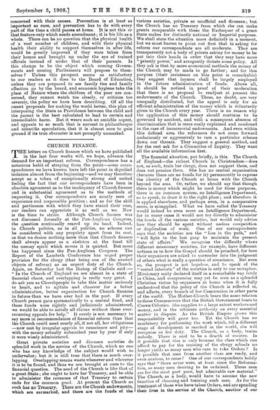A NEW EDUCATIONAL POLICY.
THE Board of Education are evidently determined to clear themselves from the reproach of being unable to attend to more than one thing at a time. It is almost a commonplace among educational reformers that the religious difficulty stops the way to many real improve- ments in the conditions of elementary education. Until this has been got rid of—this is what is constantly said, and what we have probably said ourselves—there is no hope of gaining public attention for such questions as what children shall be taught, to what age and with what relaxations of rule they shall be kept at school, and what provision shall be made to ensure that what they have learnt there shall not be forgotten. If the Board of Education share the general belief in these respects, they are not open to any similar charge in matters of hygiene. The remarkable Circular they have just issued, and the earlier one to which this is a supplement, show conclusively that the late and the present Ministers of Education have not allowed their thoughts to be narrowed by the con- sideration of denominational problems. The bodies of the children have interested them equally with their minds. They may even have hoped that in the excitement of theological controversy their tentative approaches to heroic legislation in another direction might pass unnoticed. When Churches fall out school clinics may come by their own. Whether we approve or distrust these efforts, there can be no question as regards either their novelty or their extent. We are about to embark, so far as a single Department of the Executive can bring this result about, upon a new and far-reaching experiment in the substitution of the State for the parent.
The way for this change was prepared some ten months ago. In their Memorandum on medical inspection of children in elementary schools the Board defined the object of such inspection of children as " the physical improvement, and, as a natural corollary, the mental and moral improvement, of coming generations." The broad requirements of a healthy life, they went on to say, " are comparatively few and elementary, but they are essential, and should not be regarded as applicable only to the case of the rich." Unfortunately the improvement they desire to see effected requires the co-operation of other authorities. There are moments when Liberals find themselves hindered by their exaggerated devotion to local self-government. Their own favourite fetish has tied the hands of its worshippers. No doubt between the issue of suggestions by the central authority and their adoption by the local authorities to whom they are offered there is often an interval of uncertain length. This has been very visible in the housing question. The main point of Mr. Burns's Bill is less the creation of fresh powers than the making compulsory the use of those which the local authorities already possess. But the fact that this interval has existed in the past, and will probably continue to exist for some time to come, does not make such Circulars as those of which we are speaking unimportant. On the contrary, the capture of the central authority by a particular idea is sometimes a very real step towards the capture of the subordinate authorities. There was an instance of this in the relaxation of the regulations relating to outdoor relief which we owe to Mr. Walter Long. The Guardians were not obliged to make the new policy their own, but at every election there is a possibility of the contest turning on it. No one can deny that " there exists in certain classes of the English people • a somewhat high degree of physical unfitness," and the obvious importance of gaining information on this point rightly suggested the medical inspection of children while they are at school. In the classes in which this physical unfitness is most often found almost every child passes through the elementary schools, and so can be inspected at the pleasure of the school authorities. What is wanted, however, is not merely a record of defects; it is such knowledge of the causes of those defects as may lead to their cure or their prevention. But on whom is the responsibility for the cure or the prevention to rest? In the Circular of last year the Board of Educa- tion speak hopefully of the effect of the new legislation on the parents. Their sense of duty in matters affecting the health of their homes is to be stimulated ; their interest and services are to be enlisted ; their " sense of responsi- bility for the personal hygiene of their children " is to be educated. In the Circular just issued these expectations seem to have been somewhat moderated. We now meet with an admission that " the establishment of school clinics for purposes of treatment of defects revealed by inspection gives rise to questions of considerable difficulty. On the one hand, inspection which begins and ends in the collection of statistics is of little value. On the other hand, inspection which ministers directly to the cure of the ailments tabulated in these statistics may easily lead to the almost total suppression of parental responsi- bility. If the local authority undertake to look after the children's health, why should the parent meddle with work which he cannot do nearly so well as the official persons out of whose hands he is expected to take it? The Board will therefore require to be informed by what means the local education authority propose to secure that " only those children shall be treated in a school clinic for whose treat- ment adequate provision cannot otherwise be made." Will, the parents do their part ? If they will not, are there any voluntary associations or institutions, such as hospitals which will undertake the work ? If neither of these means can be depended on, is it proposed to employ the agency of the Poor Law ? We greatly doubt whether the parents will be inclined to do anything. If they are careless, they will be under no temptation to take on themselves duties which the State is ready to do for them. If they have the welfare of their children at heart, why should they deny them the incidental advantages which their poverty confers on them ? How can a poor home be expected to equal a school clinic in hygienic advantages ? Among the well-to-do classes it is more and more the custom to send sick people to nursing-homes on the ground that they furnish medical and surgical aids which are not so near at hand in their own houses. This will be still more true of sick children in poor houses, and the inducement to send them to a school clinic, or rather to stand by and see them taken there, will be all the greater that, while the nursing-home costs money, the school clinic is to be had for nothing.
There remains the Poor Law. But our confidence in help from this source has been a. good deal shaken of late.
The growing tendency of legislation affecting the poor is to withdraw whole classes of persons from the operation of the Poor Law in order to place them in separate classes in which inability to maintain themselves shall not lead to their being accounted paupers. Medical relief has already in certain cases ceased to involve this " stigma," and why should the law deal harshly with parents whose sole fault is inability to give their children in their homes advantages which even rich parents cannot always command in theirs ?
In the Times of Tuesday " A County Councillor" points out some additional consequences which are likely to follow from this new departure. The most trying period of a child's life is over before he comes to school. Improper food, want of ventilation, insufficient clothing or firing, and the like are bad for a child between seven and fourteen.
But they are equally, or more, injurious when he is under seven. If the medical care he needs during the school years is to be provided by the State, why should it be withheld in the still more trying period when he is only preparing for school ? Unless a good reason can be found for setting up a distinction in this respect—and we can see none— the entire medical care of working-class children under fourteen will by degrees be undertaken by the State. Far the Circulars of the Board of Education do not deal only with the treatment of specific diseases; they are equally
concerned with their causes. Prevention is at least as important as cure, and prevention has to do with every part of the time a child passes at home. It is not this or that feature only which needs amendment; it is his life as a whole. There can be no question that the physical health of a vast number of children, and with their physical health their ability to support themselves in after life, would be greatly improved if they were taken from their homes and brought up under the eye of trained officials instead of under that of their parents. Is this change to be the object which coming Govern- ments and coming Parliaments will propose to them- selves ? Unless this prospect seems as satisfactory to our readers as it does to the Board of Education, unless they are prepared to see family ties and family affection go by the board, and economic hygiene take the place of Nature where the children of the poor are con- cerned, they cannot watch too closely, or criticise too severely, the policy we have been describing. Of all the recent proposals for making the world better, this plan of interposing the State as Providence between the child and the parent is the best calculated to lead to certain and irremediable harm. But it wears such an amiable aspect, and appeals to so much that is current in philanthropic and scientific speculation, that it is almost sure to gain ground if its true character is not promptly unmasked.







































 Previous page
Previous page